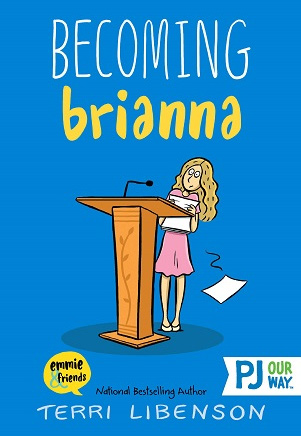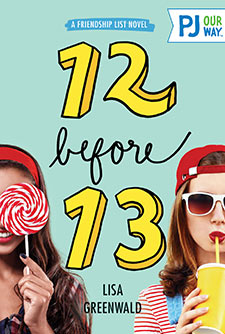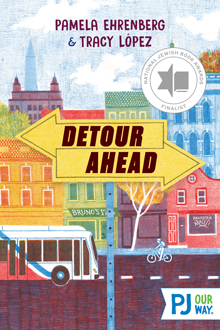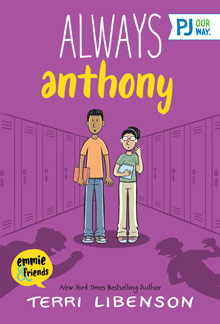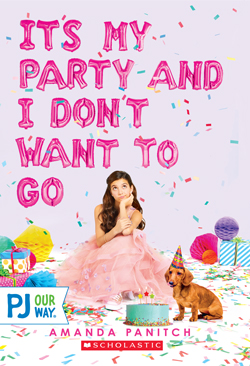Becoming Brianna
Brianna hates being the center of attention, so why on earth did she agree to have a bat mitzvah? And why are the popular girls suddenly being so friendly?
Average Rating
( hint: Login to leave a review! )
698 Reviews
Leave Review
What the Book is About
Jewish Content & Values
Positive Role Models
Content Advisory
Talk it Over!
More for You
Brianna hates being in the spotlight, so it takes a lot of persuasion from her mom before she’ll agree to have a bat mitzvah. Brianna’s feelings of terror and resentment – but also, unexpectedly, excitement – are revealed in chapters that alternate between the months before the bat mitzvah and the big day itself. But it’s not all about the bat mitzvah: Brianna’s best friend Emmie has started spending a lot of time with Sarah, while the popular girl, Zoe, is suddenly oddly interested in hanging out with Brianna. Does this mean the end of Bri and Em’s friendship? This engaging and fast-paced graphic novel is part of the bestselling Emmie & Friends series.
- The majority of the book focuses on Brianna’s preparations for her bat mitzvah, including her struggles with learning Hebrew, writing her d’var Torah (talk based on the week’s Torah portion) and her search for meaning in her parasha (Torah portion), and the process itself.
- The line in Brianna’s parasha, “We will do and we will hear” sparks a conversation with her rabbi that makes her appreciate the encouragement of questioning in Jewish tradition and realize that she is enjoying the learning process.
- Brianna’s mother tells her that her Jewish community had been very supportive to her when she was getting divorced from Brianna’s father and that she hopes Brianna will want to be part of a Jewish community of her own one day.
- Rabbi Nosanchuk and Cantor Jordana Caruso-Sager at Brianna’s Reform temple are supportive and understanding of her nervousness and ambivalence about her bat mitzvah. Their encouragement of her questioning and discussions about her doubts are what finally give the bat mitzvah meaning for her and make her proud to be Jewish.
- Almost until the last minute, Brianna is unsure she wants to have a bat mitzvah, but when given the chance to cancel it, she decides it’s right to stick to the commitment she made. She finds meaning in the process of exploring and questioning the content of her Torah portion. She also realizes that she needs to apologize to Emmie in order to restore their friendship.
None.
Brianna’s best friend, Emmie, tells Brianna that there are rumors that the bat mitzvah party will be a big event. She says that popular girl Zoe is just using Brianna to get an invitation and isn’t really her friend. Brianna gets very angry, so the best friends stop talking, and Brianna won’t apologize for a long time. Do you think Emmie was right to tell Brianna something that would upset her? What would you do if your friend told you something you really didn’t want to hear?
Brianna belongs to a Reform synagogue, where, as with Conservative temples, girls have a bat mitzvah at the age of 13. But the bat mitzvah ceremony did not become common practice in any denomination until the 1970s. The first public bat mitzvah ceremony in the United States took place in 1922, when Judith Kaplan, the daughter of Reconstructionist Rabbi Mordecai Kaplan, read from a Chumash (book form of the Torah) rather than the Torah scroll itself. In many modern Orthodox communities today, the 12-year-old bat mitzvah girl reads from the Torah in a women-only service. A girl’s coming of age is often marked in some form in Haredi (ultra-Orthodox) communities too, with the bat mitzvah giving a d’var Torah at an all-women gathering followed by a lunch.
What the Book is About
Brianna hates being in the spotlight, so it takes a lot of persuasion from her mom before she’ll agree to have a bat mitzvah. Brianna’s feelings of terror and resentment – but also, unexpectedly, excitement – are revealed in chapters that alternate between the months before the bat mitzvah and the big day itself. But it’s not all about the bat mitzvah: Brianna’s best friend Emmie has started spending a lot of time with Sarah, while the popular girl, Zoe, is suddenly oddly interested in hanging out with Brianna. Does this mean the end of Bri and Em’s friendship? This engaging and fast-paced graphic novel is part of the bestselling Emmie & Friends series.
Jewish Content & Values
- The majority of the book focuses on Brianna’s preparations for her bat mitzvah, including her struggles with learning Hebrew, writing her d’var Torah (talk based on the week’s Torah portion) and her search for meaning in her parasha (Torah portion), and the process itself.
- The line in Brianna’s parasha, “We will do and we will hear” sparks a conversation with her rabbi that makes her appreciate the encouragement of questioning in Jewish tradition and realize that she is enjoying the learning process.
- Brianna’s mother tells her that her Jewish community had been very supportive to her when she was getting divorced from Brianna’s father and that she hopes Brianna will want to be part of a Jewish community of her own one day.
Positive Role Models
- Rabbi Nosanchuk and Cantor Jordana Caruso-Sager at Brianna’s Reform temple are supportive and understanding of her nervousness and ambivalence about her bat mitzvah. Their encouragement of her questioning and discussions about her doubts are what finally give the bat mitzvah meaning for her and make her proud to be Jewish.
- Almost until the last minute, Brianna is unsure she wants to have a bat mitzvah, but when given the chance to cancel it, she decides it’s right to stick to the commitment she made. She finds meaning in the process of exploring and questioning the content of her Torah portion. She also realizes that she needs to apologize to Emmie in order to restore their friendship.
Content Advisory
None.
Talk it Over!
Brianna’s best friend, Emmie, tells Brianna that there are rumors that the bat mitzvah party will be a big event. She says that popular girl Zoe is just using Brianna to get an invitation and isn’t really her friend. Brianna gets very angry, so the best friends stop talking, and Brianna won’t apologize for a long time. Do you think Emmie was right to tell Brianna something that would upset her? What would you do if your friend told you something you really didn’t want to hear?
More for You
Brianna belongs to a Reform synagogue, where, as with Conservative temples, girls have a bat mitzvah at the age of 13. But the bat mitzvah ceremony did not become common practice in any denomination until the 1970s. The first public bat mitzvah ceremony in the United States took place in 1922, when Judith Kaplan, the daughter of Reconstructionist Rabbi Mordecai Kaplan, read from a Chumash (book form of the Torah) rather than the Torah scroll itself. In many modern Orthodox communities today, the 12-year-old bat mitzvah girl reads from the Torah in a women-only service. A girl’s coming of age is often marked in some form in Haredi (ultra-Orthodox) communities too, with the bat mitzvah giving a d’var Torah at an all-women gathering followed by a lunch.

